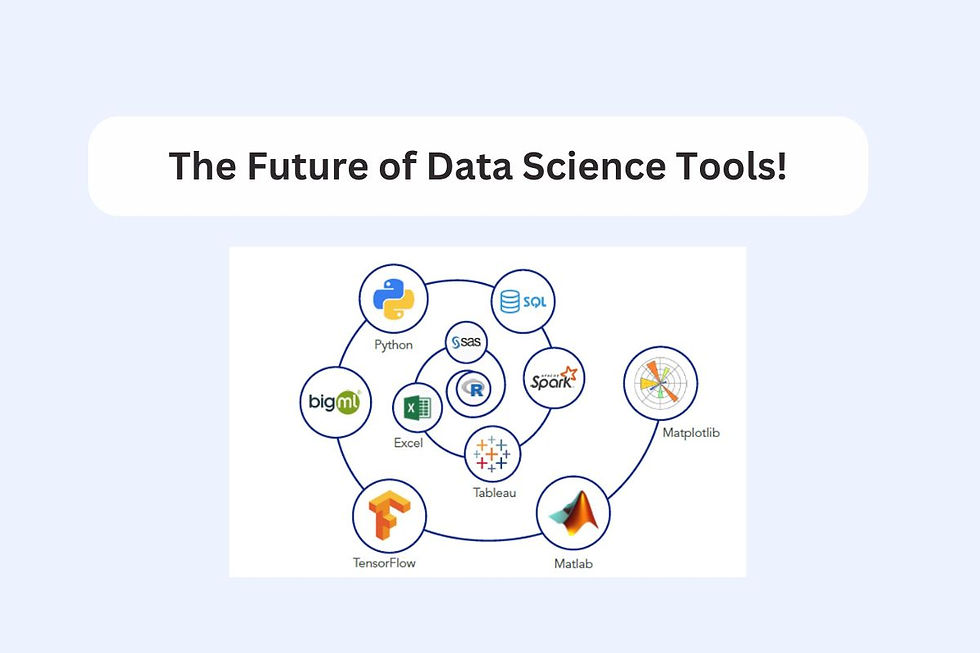The Impact of AI on Data Science Methodologies
- archi jain

- Oct 28, 2024
- 4 min read
Artificial Intelligence (AI) is transforming many fields, and data science is no exception. The intersection of AI and data science is creating new methodologies and enhancing existing ones, allowing professionals to analyze data more efficiently and extract valuable insights. In this article, we'll explore how AI is influencing data science methodologies, the benefits it brings, and some challenges that come with this integration.
Understanding Data Science
Before diving into the impact of AI, it's essential to understand what data science is. Data science combines various disciplines, including statistics, computer science, and domain knowledge, to analyze and interpret complex data sets. The goal is to extract meaningful insights that can inform decision-making and drive strategic initiatives.
Key Components of Data Science:
Data Collection: Gathering data from various sources, including databases, online platforms, and sensors.
Data Cleaning: Preparing data for analysis by removing errors and inconsistencies.
Data Analysis: Applying statistical and machine learning techniques to uncover patterns and trends.
Data Visualization: Presenting data insights in a visually understandable manner, often through charts and graphs.
Decision-Making: Using insights to inform strategic decisions and actions.
How AI is Transforming Data Science Methodologies
AI technologies, particularly machine learning (ML) and deep learning, are revolutionizing data science. Here’s how:
1. Enhanced Data Analysis
AI algorithms can process vast amounts of data quickly and identify patterns that might be missed by traditional methods. For example, supervised learning techniques allow data scientists to train models on labeled data, leading to more accurate predictions and classifications.
Example: In healthcare, AI can analyze patient data to identify risk factors for diseases, improving early diagnosis and treatment.
2. Automation of Routine Tasks
AI automates many repetitive tasks that data scientists previously handled manually, such as data cleaning and feature engineering. This automation allows data scientists to focus on more complex aspects of their work, such as model development and interpretation.
Example: Tools like AutoML (Automated Machine Learning) can automatically select algorithms, optimize parameters, and preprocess data, significantly speeding up the workflow.
3. Improved Predictive Modeling
AI enhances predictive modeling by using advanced techniques that improve accuracy. Deep learning models, for instance, can learn complex relationships in data, making them ideal for tasks like image and speech recognition.
Example: E-commerce platforms use AI to analyze customer behavior and predict future purchases, enabling personalized marketing strategies.
4. Real-Time Data Processing
With the help of AI, data scientists can analyze data in real time, allowing for immediate insights and actions. This capability is essential in industries where timely decision-making is crucial, such as finance and cybersecurity.
Example: AI-powered algorithms can detect fraudulent transactions in real time, alerting financial institutions to potential threats instantly.
5. Enhanced Data Visualization
AI tools can create dynamic visualizations that automatically update as new data becomes available. This allows data scientists and stakeholders to see trends and insights in real time.
Example: Dashboards powered by AI can present live data analytics for businesses, helping teams monitor key performance indicators (KPIs) effectively.
Benefits of Integrating AI into Data Science
The integration of AI into data science methodologies offers several benefits:
Increased Efficiency: Automation of routine tasks allows data scientists to work more efficiently and focus on high-value activities.
Greater Accuracy: AI algorithms can analyze complex data sets with higher accuracy, leading to better decision-making.
Scalability: AI can handle large volumes of data and scale analyses without significant manual intervention.
Innovation: AI opens up new possibilities for data analysis, enabling the discovery of insights that were previously unattainable.
Challenges of AI in Data Science
While AI brings many advantages, it also poses several challenges:
Data Quality: AI models are only as good as the data they are trained on. Poor-quality data can lead to inaccurate predictions and insights.
Bias and Fairness: AI algorithms can perpetuate biases present in training data, leading to unfair outcomes. Ensuring fairness and accountability in AI systems is crucial.
Complexity: AI methods, especially deep learning, can be complex and require specialized knowledge. This can make it difficult for data scientists to interpret model results.
Resource Intensive: Implementing AI technologies can require significant computational resources and infrastructure, which may not be feasible for all organizations.
The Future of Data Science with AI
As AI continues to evolve, its impact on data science methodologies will only grow. Here are some future trends to watch:
Explainable AI: As AI models become more complex, the need for transparency will increase. Explainable AI aims to make model decisions understandable, helping stakeholders trust the outcomes.
Hybrid Models: Combining traditional statistical methods with AI techniques will likely become more common, allowing data scientists to leverage the strengths of both approaches.
Increased Collaboration: Data scientists will increasingly collaborate with AI specialists to develop integrated solutions, enhancing the effectiveness of data-driven strategies.
Ethical Considerations: The integration of AI into data science will bring ethical concerns to the forefront, prompting discussions about responsible AI use and data privacy.
Conclusion
The integration of AI into data science methodologies is reshaping how organizations analyze data and make decisions. With enhanced data analysis, automation of routine tasks, and improved predictive modeling, AI offers powerful tools that enable data scientists to derive insights more efficiently. However, challenges such as data quality, bias, and complexity must be addressed to harness the full potential of AI in data science.
As we look to the future, the collaboration between AI and data science will continue to evolve, driving innovation and improving the ability to make data-informed decisions. By embracing these advancements and investing in Best Data Science Training in Noida, Delhi, Gurgaon, and other locations in India, organizations can stay competitive in an increasingly data-driven world.








Comments